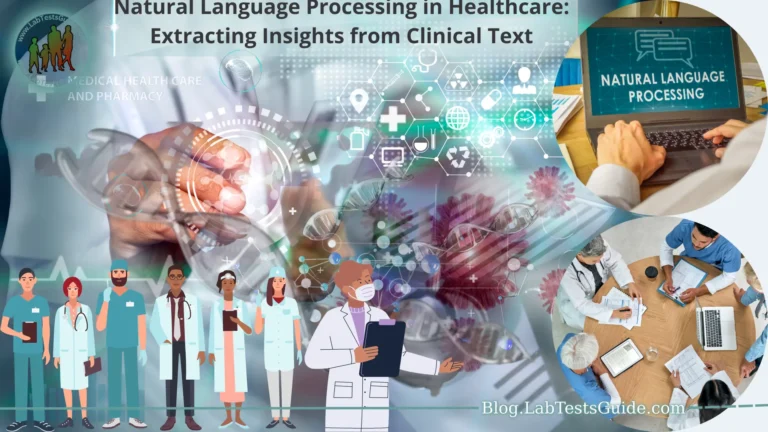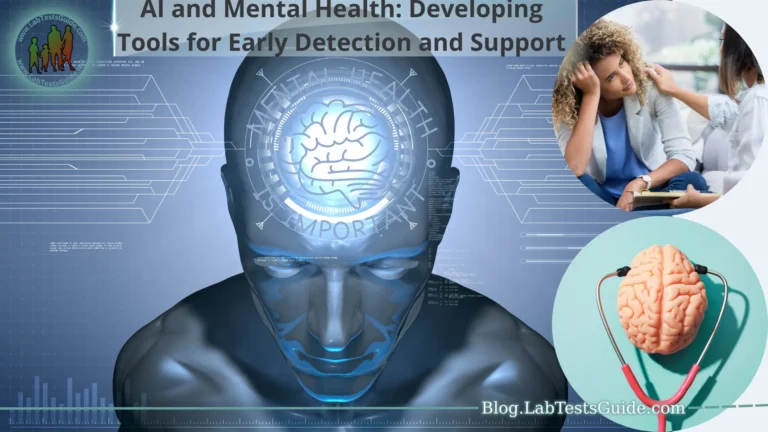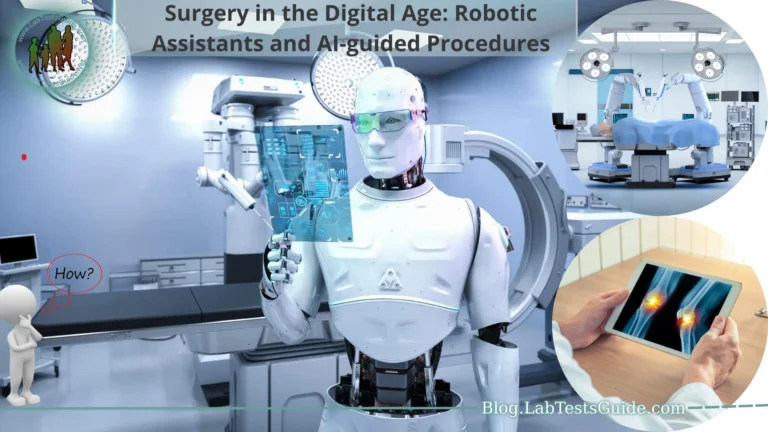Future of Healthcare: The integration of artificial intelligence (AI) with electronic health records (EHRs) stands at the forefront of healthcare innovation, promising to reshape the way medical information is managed, analyzed, and utilized. As EHRs become increasingly central to patient care, harnessing the power of AI offers the potential to revolutionize diagnostics, treatment planning, and patient outcomes. This exploration delves into the pivotal role AI-EHR integration plays in shaping the future of healthcare, spotlighting its transformative capabilities and the exciting possibilities it holds.

What is AI-EHR Integration?
- Synergy of AI and EHRs: AI-EHR integration refers to the seamless incorporation of artificial intelligence technologies into electronic health record systems. It combines the capabilities of AI, such as machine learning and natural language processing, with the data-rich environment of EHRs.
- Enhanced Data Utilization: EHRs store comprehensive patient information, including medical history, diagnoses, medications, and lab results. AI integration harnesses this data to derive meaningful insights, patterns, and correlations that can aid healthcare decision-making.
- Data-driven Decision-making: By analyzing vast amounts of patient data, AI can assist healthcare professionals in making more informed and accurate clinical decisions. AI algorithms can detect subtle trends that might go unnoticed through manual analysis, leading to improved patient care.
- Predictive Analytics: AI-EHR integration enables predictive analytics, where AI algorithms forecast potential health outcomes based on historical data. This empowers healthcare providers to intervene early and prevent adverse events.
- Personalized Medicine: AI can create personalized treatment plans by considering a patient’s unique medical history, genetic makeup, and lifestyle factors. This tailored approach can enhance treatment effectiveness and minimize adverse reactions.
- Efficient Diagnostics: AI algorithms can rapidly process and analyze medical images, such as X-rays and MRIs, to aid in diagnosing conditions like tumors or fractures. This expedites diagnoses, leading to quicker treatments.
- Natural Language Processing (NLP): NLP techniques enable AI to understand and extract insights from unstructured text within EHRs, such as doctor’s notes. This helps in deciphering valuable information hidden in narrative descriptions.
- Reduction of Administrative Burden: AI integration can automate routine administrative tasks, such as data entry and appointment scheduling, allowing healthcare professionals to focus more on patient care.
- Challenges and Considerations: While promising, AI-EHR integration poses challenges like data privacy, interoperability, and the need for robust AI models. Careful planning and adherence to ethical standards are crucial.
- Potential Future Developments: The field of AI-EHR integration continues to evolve, with ongoing research and innovations likely to lead to even more advanced applications, such as real-time health monitoring and AI-powered drug discovery.
How to Implement AI-EHR Integration Successfully:
- Assess Needs and Objectives: Begin by thoroughly understanding the specific challenges and inefficiencies in your healthcare system that AI-EHR integration could address. Clearly define the objectives and goals you aim to achieve through this integration, such as improving diagnostic accuracy, enhancing treatment plans, or streamlining administrative processes.
- Evaluate EHR Data: Carefully review the quality, completeness, and consistency of the electronic health record (EHR) data you possess. Ensure that the data is accurately captured, well-structured, and organized to facilitate effective AI analysis. Address any data gaps or inconsistencies that might hinder the integration process.
- Choose Suitable AI Technologies: Select AI technologies that align with your integration goals and the nature of your EHR data. Depending on your objectives, consider leveraging machine learning algorithms for predictive analytics, natural language processing (NLP) for extracting insights from unstructured text, or image recognition for medical imaging analysis.
- Ensure Data Security and Privacy: Prioritize data security and privacy throughout the integration process. Implement stringent security measures to safeguard patient data during AI analysis. Adhere to relevant data protection regulations and standards, such as the Health Insurance Portability and Accountability Act (HIPAA), to ensure the ethical handling of sensitive medical information.
- Foster Collaboration: Facilitate strong collaboration between your IT department and healthcare professionals. IT experts should understand the workflows, challenges, and needs of healthcare staff, enabling the development of AI solutions that seamlessly integrate into existing processes and enhance the quality of patient care.
- Clean and Preprocess EHR Data: Prepare the EHR data for AI analysis by cleaning and preprocessing it. This involves removing duplicate or irrelevant records, handling missing data, and addressing outliers that could impact the accuracy of AI models. Well-preprocessed data is essential for training reliable AI algorithms.
- Develop AI Models: Train AI models using suitable algorithms based on the type of analysis required. Develop machine learning models using historical EHR data to predict outcomes or identify patterns. For NLP applications, design models that can extract meaningful information from clinical notes and reports.
- Integration and Testing: Seamlessly integrate the developed AI models into the EHR system. Rigorously test the integration to ensure smooth interactions between AI algorithms and EHR data. Test for accuracy, speed, and user experience, addressing any technical issues that arise during the testing phase.
- User Training: Provide comprehensive training to healthcare professionals on how to effectively utilize the AI-powered tools integrated into the EHR system. Address any concerns or resistance by offering education and support, enabling the staff to confidently incorporate AI insights into their decision-making processes.
Artificial Intelligence in Healthcare:
- Diagnostics and Imaging: AI-powered algorithms can interpret medical images (like X-rays, MRIs, and CT scans) with exceptional accuracy, aiding clinicians in detecting abnormalities and diseases such as cancer at an early stage. This leads to quicker and more precise diagnoses.
- Personalized Treatment: AI analyzes patients’ medical records, genetic information, and lifestyle data to develop personalized treatment plans. This approach optimizes therapies, minimizes adverse effects, and increases the chances of successful outcomes.
- Drug Discovery and Development: AI accelerates drug discovery by rapidly analyzing vast datasets to identify potential compounds for various diseases. It predicts drug interactions, side effects, and assesses the safety and efficacy of potential medications.
- Predictive Analytics: AI predicts disease outbreaks, patient deterioration, and healthcare trends by analyzing large volumes of historical and real-time data. This allows healthcare systems to proactively allocate resources and plan interventions.
- Natural Language Processing (NLP): NLP enables AI to understand and analyze unstructured text data, such as medical notes and research papers. It facilitates quick access to valuable insights and enhances data-driven decision-making.
- Remote Monitoring and Telemedicine: AI-powered wearable devices and sensors enable real-time monitoring of patients’ vital signs. This data can be analyzed to provide early warnings of potential health issues and enable remote consultations.
- Administrative Efficiency: AI automates administrative tasks like appointment scheduling, billing, and documentation. This streamlines workflows, reduces errors, and allows healthcare professionals to focus more on patient care.
- Genomic Analysis: AI helps interpret vast amounts of genomic data, aiding in identifying genetic predispositions to diseases and guiding personalized treatment approaches.
- Surgical Assistance: AI assists surgeons by offering real-time insights during surgeries. It helps with precision, reduces risks, and enhances outcomes.
- Epidemiology and Public Health: AI analyzes population health data to identify patterns, track disease spread, and assist public health agencies in effective response strategies.
Enhancing Diagnostics and Clinical Decision-making:
- Precise Medical Imaging Interpretation: AI-powered algorithms analyze medical images with exceptional accuracy, helping radiologists and clinicians detect subtle anomalies that might be missed by the human eye. This accelerates diagnoses, leading to earlier interventions.
- Early Disease Detection: AI algorithms can identify patterns indicative of early stages of diseases, such as cancer, cardiovascular issues, and neurological disorders. This enables timely intervention and improves patient outcomes.
- Risk Stratification: AI analyzes patient data to predict individuals at risk of specific diseases based on factors like genetics, medical history, and lifestyle. This allows healthcare providers to tailor preventive strategies and screenings.
- Personalized Treatment Recommendations: By considering a patient’s medical history, genetic makeup, and treatment responses, AI assists clinicians in creating personalized treatment plans. This approach increases treatment effectiveness and reduces adverse reactions.
- Clinical Decision Support: AI provides evidence-based recommendations to healthcare professionals by analyzing vast amounts of medical literature and patient data. This helps clinicians make informed decisions aligned with the latest research.
- Speed and Efficiency: AI can rapidly process large datasets and provide insights within seconds. This agility improves efficiency in emergency situations and reduces waiting times for patients.
- Reduced Diagnostic Errors: AI helps mitigate diagnostic errors by offering a second opinion. This is particularly valuable in complex cases where diverse expertise is required.
- Integration with Wearable Devices: Wearable devices equipped with AI technology monitor patients’ health in real time. They can detect anomalies and alert medical professionals in case of emergencies.
- Augmented Pathology: AI enhances the capabilities of pathologists by aiding in the analysis of tissue samples and biopsies. This leads to faster and more accurate diagnosis of conditions like cancer.
- Clinical Trials and Research: AI optimizes patient recruitment for clinical trials by identifying eligible candidates from large patient databases. It also helps analyze trial results more efficiently.
- Challenges and Ethical Considerations: Despite its potential, AI integration faces challenges like data quality, bias, and the need for clinician collaboration. Ensuring transparency, interpretability, and ethical use of AI-generated insights is paramount.
Personalized Treatment Plans:
- Genomic Analysis: AI analyzes a patient’s genetic data to identify genetic variations that might influence disease susceptibility and treatment responses. This enables healthcare professionals to customize treatment strategies based on the patient’s genetic profile.
- Optimized Drug Selection: By considering a patient’s genetic information and medical history, AI recommends the most suitable medications and dosages. This reduces adverse reactions and improves treatment efficacy.
- Predicting Treatment Outcomes: AI algorithms analyze historical patient data to predict how an individual is likely to respond to a particular treatment. This helps healthcare providers make informed decisions about the most effective therapies.
- Personalized Dosage: AI factors in a patient’s metabolism, genetics, and other variables to determine the optimal dosage of medications. This minimizes the risk of over- or under-dosing.
- Real-time Monitoring: AI-enabled wearable devices continuously monitor patients and provide real-time feedback. This data helps personalize treatment plans by adjusting medications and interventions based on the patient’s current health status.
- Chronic Disease Management: AI analyzes patient data to develop long-term strategies for managing chronic conditions. This includes adapting treatment plans over time to accommodate changing health needs.
- Reduced Trial and Error: Personalized treatment plans guided by AI reduce the need for trial-and-error approaches, as healthcare professionals can make more accurate initial treatment choices.
- Informed Shared Decision-making: Patients are actively involved in their treatment decisions, with AI-generated insights helping them understand potential outcomes and risks.
- Rare Disease Management: For rare diseases with limited treatment data, AI can identify similar cases and recommend personalized therapies based on available information.
- Evolving Treatment Plans: AI continuously adapts treatment plans based on patient responses and emerging medical research. This ensures the treatment remains aligned with the patient’s evolving health needs.
- Ethical Considerations: While AI-powered personalized treatment plans offer immense benefits, ethical considerations include patient consent, data privacy, and transparency in treatment recommendations.
Predictive Analytics and Preventive Care:
Here’s how predictive analytics is transforming healthcare into a preventive paradigm.
- Early Disease Identification: AI analyzes patient data to identify subtle patterns indicative of early-stage diseases. This allows healthcare providers to intervene before conditions worsen, increasing the chances of successful treatment.
- Risk Stratification: By assessing a patient’s medical history, genetics, and lifestyle data, AI calculates an individual’s risk of developing specific diseases. This enables targeted preventive measures and screenings for high-risk patients.
- Identifying Health Trends: AI examines population health data to identify trends and potential outbreaks of diseases. This information empowers public health agencies to respond quickly and allocate resources effectively.
- Personalized Health Plans: Predictive analytics tailors health plans based on an individual’s risk factors and health history. This approach optimizes preventive measures, reducing the likelihood of disease progression.
- Remote Monitoring and Alerts: AI-powered devices track patients’ vital signs and health data in real time. If anomalies are detected, healthcare professionals receive alerts, enabling timely interventions.
- Chronic Disease Management: Predictive analytics helps manage chronic diseases by forecasting disease exacerbations or complications. This allows for proactive adjustments to treatment plans.
- Optimized Resource Allocation: Healthcare facilities use AI to predict patient admission rates, enabling efficient allocation of staff and resources during peak demand periods.
- Medication Adherence: AI predicts patient adherence to medication regimens by analyzing historical data and identifying patterns that could lead to non-compliance. Healthcare providers can then intervene to ensure better adherence.
- Individualized Preventive Strategies: AI-generated insights guide patients toward personalized preventive strategies based on their health data. This empowers individuals to take ownership of their health and make informed lifestyle choices.
- Economic Efficiency: Preventive interventions driven by predictive analytics can reduce hospitalizations and expensive treatments, leading to cost savings for healthcare systems and patients alike.
- Ethical Considerations: While predictive analytics holds promise, ethical considerations include patient consent, data privacy, and maintaining transparency in communicating potential health risks.
Data Privacy and Security:
- Confidentiality of Patient Data: AI applications often require access to patients’ sensitive health records. Robust encryption and access controls are implemented to ensure that only authorized personnel can access this information.
- Secure Data Storage and Transmission: Healthcare organizations use encryption protocols to secure data both at rest and during transmission. This safeguards patient information from unauthorized access during storage and while being transferred between systems.
- Access Control and Authentication: Multi-factor authentication and role-based access control mechanisms are enforced to ensure that only authorized individuals can access specific parts of patient records.
- Data Minimization: Only necessary data is collected and stored, reducing the potential impact of a data breach. Unnecessary patient information is avoided, minimizing the risk associated with data exposure.
- Anonymization and De-identification: Before sharing patient data for research or analytics, AI systems often anonymize or de-identify the data to prevent re-identification of individuals.
- Regular Security Audits and Assessments: Healthcare organizations conduct routine security audits and vulnerability assessments to identify and rectify potential weaknesses in their systems.
- Employee Training: Healthcare staff undergo rigorous training on data privacy and security best practices to prevent accidental breaches caused by human error.
- Monitoring and Intrusion Detection: Continuous monitoring and intrusion detection systems are employed to identify any unauthorized attempts to access patient data.
- Compliance with Regulations: Healthcare organizations adhere to regulatory standards such as the Health Insurance Portability and Accountability Act (HIPAA) in the US and the General Data Protection Regulation (GDPR) in the EU to ensure patient data protection.
- Vendor Security Assessment: When integrating third-party AI solutions, healthcare organizations assess the security practices of vendors to ensure that patient data is handled securely.
- Incident Response Plan: Healthcare facilities have a well-defined plan to respond to data breaches, including notifying affected patients and regulatory authorities in a timely manner.
- Ethical Considerations: Ensuring data privacy and security extends to ethical considerations like transparency in data usage and respecting patient autonomy.
Future Possibilities and Innovations:
- Precision Medicine Advancements: AI’s ability to analyze vast datasets will lead to more precise disease diagnosis and treatment customization. Patient-specific therapies will become the norm, increasing treatment efficacy and minimizing adverse effects.
- Real-time Health Monitoring: Wearable devices equipped with AI will continuously monitor vital signs and health data, providing real-time insights to healthcare providers. Early detection of anomalies will enable timely interventions.
- Predictive Health Analytics: AI-powered algorithms will predict disease outbreaks, patient deterioration, and treatment responses based on historical and real-time data. This proactive approach will revolutionize preventive care.
- AI-enhanced Drug Discovery: AI-driven simulations and analyses will accelerate drug discovery and development. Targeting specific molecular structures, AI will identify potential drug candidates more efficiently than traditional methods.
- Robotic Surgery and Assistance: AI-driven robotic surgical systems will enhance precision during procedures. AI will also provide real-time guidance and suggestions to surgeons, improving surgical outcomes.
- Natural Language Interaction: AI-powered chatbots and virtual assistants will handle routine patient inquiries, appointment scheduling, and medication reminders, enhancing patient engagement and administrative efficiency.
- Interoperable EHR Systems: AI will bridge the gap between disparate electronic health record (EHR) systems, enabling seamless data exchange and improving care coordination across healthcare facilities.
- AI-guided Clinical Trials: AI will optimize clinical trial design, patient recruitment, and monitoring, accelerating the development of new treatments and therapies.
- Neurological Disorder Diagnosis: AI will assist in early diagnosis of neurological disorders like Alzheimer’s and Parkinson’s by analyzing subtle patterns in patient data and medical images.
- Telemedicine Enhancement: AI-driven telemedicine platforms will offer advanced diagnostic capabilities, enabling remote healthcare consultations with accuracy comparable to in-person visits.
- Global Health Monitoring: AI’s ability to process massive amounts of data will aid in monitoring global health trends, enabling rapid response to outbreaks and pandemics.
- Ethical AI in Healthcare: Ethical AI frameworks will ensure transparency, accountability, and fairness in AI-driven healthcare decisions. Regulatory bodies will play a crucial role in defining and enforcing ethical standards.
FAQs:
What is AI in healthcare?
AI in healthcare refers to the application of artificial intelligence technologies, such as machine learning and data analysis, to enhance various aspects of healthcare, including diagnostics, treatment, drug discovery, and patient care.
How does AI improve diagnostics?
AI analyzes medical images, patient records, and genetic data to detect patterns and anomalies that can aid in diagnosing diseases at an early stage. This leads to more accurate and timely diagnoses.
What is personalized medicine?
Personalized medicine involves tailoring medical treatment plans to individual patients based on their genetic makeup, medical history, and other factors. AI plays a role by analyzing data to customize treatment approaches.
How does AI predict disease outbreaks?
AI analyzes historical health data and real-time information to identify patterns and trends that could indicate potential disease outbreaks. This enables proactive measures to control and prevent the spread of diseases.
What is the role of AI in drug discovery?
AI accelerates drug discovery by analyzing vast datasets to identify potential drug candidates, predict their effectiveness, and optimize drug design. This speeds up the development of new treatments.
How does AI assist in surgical procedures?
AI aids surgeons by providing real-time insights during surgeries, helping with precision and decision-making. Robotic surgical systems driven by AI can perform complex procedures with enhanced accuracy.
Can AI improve patient engagement?
Yes, AI-powered chatbots and virtual assistants can interact with patients, provide information, schedule appointments, and offer medication reminders, enhancing patient engagement and communication.
Is patient data secure with AI?
Data privacy and security are paramount in healthcare AI. Robust encryption, access controls, and compliance with regulations (like HIPAA) ensure patient data remains confidential and secure.
How does AI impact clinical trials?
AI optimizes various aspects of clinical trials, including patient recruitment, trial design, and data analysis. This accelerates the development of new treatments and therapies.
What are the ethical considerations with AI in healthcare?
Ethical considerations include ensuring transparency, fairness, and accountability in AI-driven decisions. Addressing bias, obtaining informed consent, and maintaining patient autonomy are also vital.
Conclusion:
In conclusion, the integration of Artificial Intelligence (AI) in healthcare stands as a transformative force poised to revolutionize medical practices and patient outcomes. With its capacity to enhance diagnostics, tailor treatment plans, predict health trends, and enable proactive interventions, AI is reshaping the healthcare landscape. The synergy of AI with electronic health records, coupled with advancements in predictive analytics, personalized medicine, and ethical AI practices, promises a future where patient care is more precise, preventive, and patient-centered. As AI continues to evolve, its potential to drive medical innovation and empower healthcare professionals underscores its pivotal role in shaping the future of healthcare delivery and improving overall population health.






